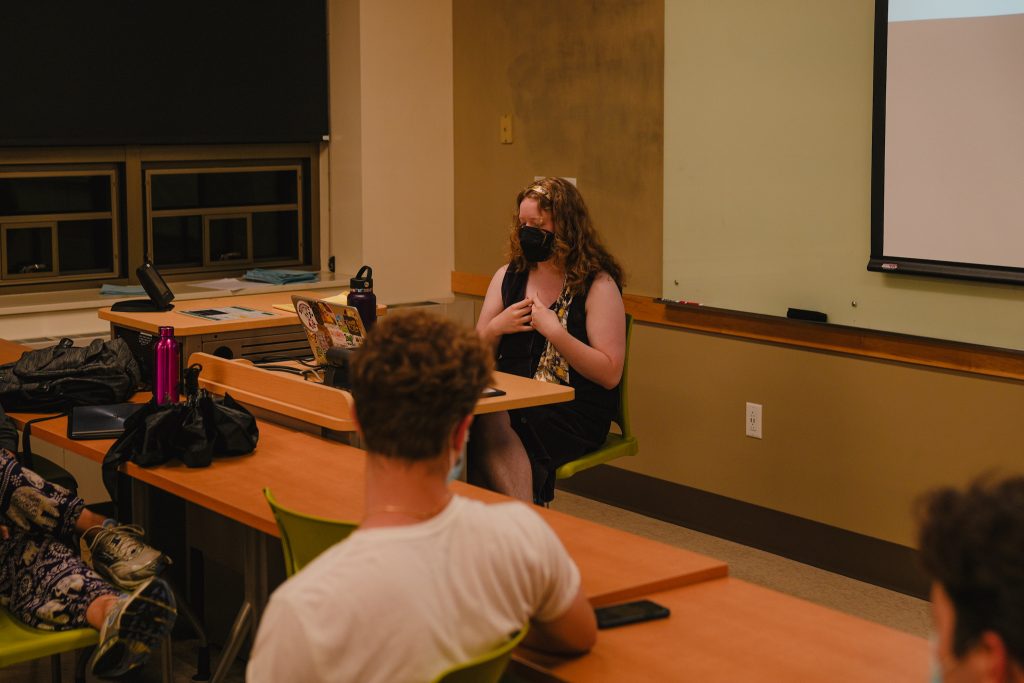
Binghamton University’s Young Democratic Socialists of America (YDSA) hosted a panel for student workers on Monday.
The panel gave students the opportunity to have an open discussion about their campus jobs, as well as the expectations, responsibilities and working environments that come with it, according to the YDSA’s Instagram. Students in attendance took turns sharing their personal experiences working at BU, which included things they enjoy, dislike or wish they could change about their jobs.
One such attendee was John Ferrara, who serves as a tutor for the University’s Tutoring Services (UTS) and the Educational Opportunity Program (EOP), and is a sophomore majoring in biology. Ferrara said he applied to be a tutor because it was fulfilling to help people with the same things he once struggled with. He added that he likes that EOP focuses on helping underprivileged students.
Hudson Jakubowicz, also a UTS tutor and a junior majoring in biochemistry, agreed with Ferrara, and said the job has its benefits.
“I like being able to set my own hours and just interacting with the students,” Jakubowicz said. “They make the subject fun, because something like chemistry can be a dry subject. Being able to have some discussion with them just makes the session better. It’s something that keeps me engaged and that I enjoy even though it is technically my job.”
However, Ferrara and Jakubowicz also said they wished they were paid more for their services. Ferrara mentioned that there are times when more people than expected would show up to his tutoring sessions, and that getting paid minimum wage for those uncertainties was like “a slap in the face.”
In search of better pay, Jakubowicz said he has considered becoming a private tutor but decided being associated with the University was more valuable.
“I also like to be affiliated with the University because that means that professors and other people can recommend me to their students,” Jakubowicz said. “Whereas if I was a private tutor then I’d only be able to work with people who have the means to get my services, and that is not something that I would enjoy.”
Jakubowicz added that the University often treats student jobs as educational opportunities, rather than focusing on the reasons students need the jobs in the first place.
“I just think the mentality around it ignores the fact that a lot of these jobs are one of the ways that people are trying to pay one of their biggest expenses, which is being able to attend this college,” Jakubowicz said. “Some recognition that we are taking these jobs to be able to pay for this school is something that would go a long way.”
Additionally, some students expressed a desire to have a say in what gets written into their contracts. Noelle Dutch, chair of the YDSA, an organizer of the event and a senior majoring in political science, added that many job descriptions do not include the fact that supervisors ask more of their employees than what is mentioned on the contract.
“I just wish that we were at the table to make some of these decisions about our own jobs,” Dutch said. “I guess just even getting to be in the room and to come up with a contract that kind of says what part of our role is [enough] because anything our supervisor asks of us is also our role.”
Dutch said it was important to the YDSA to be able to hold events for student workers to talk freely and [to] recognize how important they are to the campus community. The YDSA will be hosting an educational follow-up meeting on Tuesday, Sept. 20, to discuss workplace communication and organizing, according to their B-Engaged page.
“A lot of our jobs are fundamental to the functioning of the school,” Dutch said. “Having students building awareness around their jobs is also really important and just being free to express how they feel about their jobs, whether it’s something positive and they absolutely love it or maybe they have complaints they haven’t been able to air before. I think providing a safe space for that is going to be super beneficial to the morale on campus and of student workers.”


